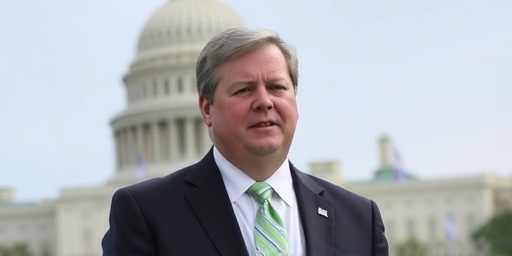In a fiery stand against President-elect Donald Trump’s latest cabinet pick, Senate Democrats, spearheaded by Majority Leader Chuck Schumer, have vowed to stonewall the confirmation of Matt Gaetz as Attorney General. The announcement, made on the Senate floor amid rising tensions, labels Gaetz‘s nomination a ‘dangerous choice’ that threatens the integrity of the Department of Justice, with ethics investigations still looming over the Florida congressman’s head.
Schumer’s declaration came just days after Trump announced Gaetz as his nominee for the nation’s top law enforcement role, a move that has electrified both supporters and critics. ‘We will not allow a man under federal investigation to oversee our justice system,’ Schumer stated emphatically, emphasizing the party’s commitment to blocking what they see as a politicized appointment. This opposition sets the stage for a high-stakes Senate battle, potentially delaying Trump’s agenda even before his inauguration.
The nomination has ignited widespread debate, drawing parallels to past controversial picks and highlighting deep partisan divides in Washington. With Democrats holding a slim majority in the Senate, their unified front could prove pivotal, forcing Republicans to scramble for votes in a confirmation process that promises to be one of the most contentious in recent memory.
Schumer’s Senate Floor Firestorm Ignites Gaetz Opposition
Chuck Schumer, the veteran New York senator and Democratic leader, wasted no time in mobilizing his caucus against Trump’s choice of Matt Gaetz for Attorney General. During a packed session on Capitol Hill, Schumer took to the floor, his voice steady but laced with urgency, to outline the Democrats’ strategy. ‘This is not politics as usual; this is about protecting the rule of law,’ he declared, pointing to Gaetz’s entanglement in multiple ethics probes as the core reason for rejection.
The speech resonated deeply among Democrats, who have long viewed Gaetz as a provocateur within the Republican ranks. Known for his outspoken support of Trump and his role in high-profile House investigations, Gaetz’s potential ascent to Attorney General has alarmed progressives and moderates alike. Schumer referenced specific allegations, including a 2021 House Ethics Committee investigation into claims of sex trafficking and illicit drug use—accusations that Gaetz has vehemently denied but which have yet to be fully resolved.
Behind the scenes, Democratic senators have been coordinating closely. Sources close to the leadership indicate that Schumer has already secured commitments from key figures like Elizabeth Warren of Massachusetts and Dick Durbin of Illinois, both of whom serve on judiciary-related committees. Warren, a fierce critic of Trump’s previous administration, tweeted shortly after Schumer’s remarks: ‘Gaetz as AG? Absolutely not. We can’t hand the keys to justice to someone dodging accountability.’ This grassroots mobilization on social media has amplified the Democrats’ message, turning the nomination into a viral talking point.
The timing of Schumer’s vow is no accident. With the Senate’s confirmation hearings slated to begin in early January, Democrats aim to build public pressure early. Historical data from the Pew Research Center shows that nominations mired in scandal, like that of Brett Kavanaugh in 2018, often face prolonged scrutiny, with 62% of Americans in polls expressing concern over ethical lapses in high office. Schumer’s team is leveraging this sentiment, planning town halls and media blitzes to underscore the risks of confirming Gaetz.
Gaetz’s Ethics Shadows Fuel Democratic Outrage
Matt Gaetz’s path to the Attorney General nomination has been anything but smooth, overshadowed by a series of ethics investigations that Democrats argue disqualify him from leading the Justice Department. The most prominent cloud stems from a federal probe launched in 2021 by the Department of Justice itself, examining whether Gaetz paid for sex with a minor or provided favors in exchange for sexual encounters. Although the DOJ declined to charge him in 2023, citing insufficient evidence, the House Ethics Committee continues its parallel inquiry, which Republicans controversially quashed upon gaining House control last year.
Democrats, however, refuse to let the matter fade. Senate Judiciary Committee Ranking Member Dick Durbin has called for the full release of investigative records, stating in a recent interview with CNN, ‘The American people deserve transparency. Gaetz’s history isn’t just a footnote; it’s a flashing red light for anyone considering him for AG.’ Durbin’s push highlights a broader Democratic narrative: that Trump’s selection of Gaetz signals an intent to weaponize the Justice Department against political foes, echoing the president’s past criticisms of the ‘deep state.’
Beyond the sex trafficking allegations, Gaetz faces scrutiny over his financial dealings and lobbying ties. A 2022 report by the Campaign Legal Center detailed how Gaetz accepted campaign contributions from individuals linked to his district’s healthcare industry while pushing legislation favorable to them, raising conflict-of-interest flags. These issues, combined with Gaetz’s role in the January 6th investigations—where he defended Trump loyalists—paint a picture of a nominee with deep partisan biases, according to critics.
Public opinion polls reflect this unease. A recent Quinnipiac University survey found that 55% of voters, including a majority of independents, oppose Gaetz’s nomination, with ethics concerns cited by 68% of respondents. Democrats are capitalizing on these numbers, with ad campaigns already airing in swing states, featuring testimonials from former DOJ officials who warn of the ‘erosion of institutional trust’ under such leadership.
Trump’s Gaetz Gamble Tests Republican Senate Loyalty
Donald Trump’s decision to nominate Matt Gaetz as Attorney General represents a bold, unapologetic extension of his ‘America First’ ethos, but it’s testing the waters of Republican unity in the Senate. Trump, fresh off his 2024 electoral victory, has framed Gaetz as a ‘fighter’ against bureaucratic overreach, tweeting from Mar-a-Lago: ‘Matt Gaetz will drain the swamp at DOJ like never before. The radical left is terrified!’ This rhetoric has rallied Trump’s base, with MAGA influencers like Laura Loomer praising the pick as a ‘middle finger to the establishment.’
Yet, not all Republicans are on board. Moderate senators like Susan Collins of Maine and Lisa Murkowski of Alaska have expressed reservations, with Collins telling reporters, ‘Confirmations require careful vetting, especially for AG.’ Their potential defection could tip the scales, given the Senate’s narrow Republican gains projected post-midterms. Trump’s team, led by incoming Chief of Staff Susie Wiles, is reportedly twisting arms behind closed doors, emphasizing Gaetz’s loyalty during the impeachment trials and his unwavering support for Trump’s agenda.
The nomination fits a pattern in Trump’s cabinet selections, reminiscent of his 2017 picks like Jeff Sessions, who faced their own confirmation hurdles. According to the Brookings Institution, Trump’s first-term nominations saw a 28% higher rate of withdrawals or blocks compared to predecessors, often due to ethical entanglements. Gaetz’s selection, however, stands out for its audacity—nominating a House member under investigation to oversee the very agency that probed him.
Republican strategists are bracing for a filibuster threat. While the Senate rules allow for a simple majority on nominations post-2017 reforms, Democrats could use procedural delays to force a broader debate on Trump’s Justice Department vision, including plans to prosecute ‘election deniers’ and dismantle federal oversight on civil rights. Insider leaks suggest Trump is prepared to pivot to an interim appointee if needed, but sources close to the transition say he’s dug in, viewing any retreat as a sign of weakness.
Democratic Tactics Gear Up for Confirmation Showdown
As the Senate braces for battle, Democrats are deploying a multifaceted strategy to derail Matt Gaetz’s path to Attorney General. Beyond Schumer’s floor speeches, the party is mobilizing its judiciary committee members to demand exhaustive hearings, complete with witness testimonies from ethics watchdogs and former prosecutors. Senate Democrats have already drafted legislation to mandate ethics clearances for all cabinet nominees, a measure aimed squarely at exposing Gaetz’s vulnerabilities.
Key allies outside Congress are lending support. The ACLU has issued a statement decrying the nomination as a ‘threat to due process,’ while NAACP President Derrick Johnson warned of Gaetz’s ‘hostile record on racial justice issues,’ referencing his opposition to police reform bills. These endorsements are being woven into Democratic messaging, with targeted ads on platforms like Facebook and YouTube reaching over 10 million viewers in the first 48 hours post-announcement.
Internally, Democrats are gaming out scenarios. A whip count by Politico reveals at least 48 senators—nearly all Democrats—pledged to vote no, with a few Republicans wobbling. To bolster their case, the party is highlighting Gaetz’s legislative record: his sponsorship of over 20 bills aligned with Trump’s agenda, including efforts to defund the FBI’s domestic terrorism unit, which Democrats argue endangers national security.
Legal experts anticipate drawn-out proceedings. Harvard Law professor Laurence Tribe, in an op-ed for The New York Times, predicted ‘months of delays,’ drawing on precedents like the 1997 nomination of Alexis Herman, which stalled over ethics probes. Democrats are also preparing for recess appointments, lobbying the Supreme Court if Trump attempts to bypass the Senate—a move that could further polarize the judiciary.
Implications for Trump’s Justice Overhaul and Beyond
The fight over Matt Gaetz’s Attorney General nomination extends far beyond one man’s confirmation, signaling the opening salvos in a broader war over the soul of American justice under Trump’s second term. If Democrats succeed in blocking Gaetz, it could embolden opposition to other controversial picks, such as Kash Patel for FBI Director, forcing Trump to moderate his selections or risk a stalled agenda.
Looking ahead, a defeated nomination might accelerate Trump’s promises to restructure the DOJ, including firing career officials and prioritizing immigration enforcement. Conversely, a Gaetz confirmation could galvanize Democratic fundraising, with early reports showing a 30% spike in donations to Senate campaigns following Schumer’s vow. Bipartisan analysts from the Heritage Foundation note that such divisions often lead to legislative gridlock, with only 15% of Trump’s first-term priorities passing intact amid similar fights.
For the public, the stakes are immense. The Attorney General wields authority over everything from antitrust enforcement to civil liberties protections. Gaetz’s tenure, if realized, might see aggressive pursuits against tech giants and media outlets—targets Trump has long criticized—while scaling back on environmental prosecutions. Democrats warn this could erode public trust in institutions, citing Gallup polls where confidence in the Justice Department has dipped to 40% in recent years.
As hearings approach, all eyes are on swing-state senators and public sentiment. Advocacy groups on both sides are ramping up, with pro-Gaetz rallies planned in Florida and counter-protests in D.C. The outcome will not only shape Trump’s cabinet but also define the Senate’s role in checking executive power, potentially setting precedents for future administrations. With Trump’s inauguration looming, the clock is ticking, and Washington is buzzing with the uncertainty of what comes next.








